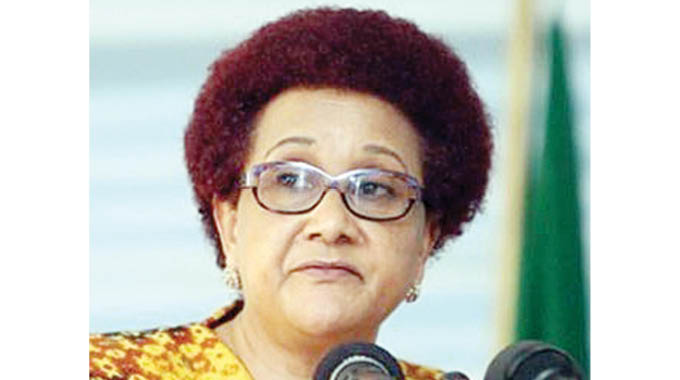SADC and ICPs agree to chart a new collaboration

The Southern African Development Community (SADC) and the International Cooperating Partners (ICPs) have risen above Covid-19 circumstances and demonstrated attributes of true indomitable partnership.
The parties once again made their discussion forum a reality when they virtually convened a half-day Annual Dialogue Platform meeting on 20 November 2020. This upholds the aspirations of the Windhoek Declaration on a New Partnership between SADC and ICPs signed in Windhoek in 2006.
The SADC-ICP Dialogue Platform meetings are a key enabler in facilitating critical conversations with ICPs and create a common understanding regarding joint considerations and approaches for the implementation of the region’s strategies and priorities.
The platform facilitates institutionalised political, policy and technical dialogue and exchange of good practice between SADC and ICPs. This is in pursuit of improving coordination, alignment, synergy, complementarity and harmonisation of procedures between the two sides, with a view to stimulating effective development cooperation and achievement of results at national and regional levels.
This year’s dialogue was co-chaired by Ambassador Alfredo Nuvunga, Director for Regional and Continental Integration (DIRCO) of the Ministry of Foreign Affairs and Cooperation of the Republic of Mozambique and Chairperson of the SADC Standing Committee of Senior Officials, and the Head of Delegation of the European Union to Botswana and SADC, and Chairperson of the ICPs, Ambassador Jan Sadek.
The dialogue was officially opened by the SADC Executive Secretary, Her Excellency Dr Stergomena Tax, and was attended by representatives of the ICPs, the SADC Double Troika Member States (represented by Botswana, Malawi, Mozambique, South Africa, United Republic of Tanzania, and Zimbabwe), representatives of Diplomatic Missions of SADC Member States in Gaborone, as well as Officials from the SADC Secretariat, led by Deputy Executive Secretary-Regional Integration, Dr Thembinkosi Mhlongo and Deputy Executive Secretary-Corporate Affairs, Ambassador Joseph Nourrice.
Amb. Nuvunga addressed a vast representation recording an outstanding turnout of about 70 delegates. This resonated with the beautiful milestone where the dawn of a new era was hailed, ushering the SADC Vision 2050 and the Regional Indicative Strategic Development Plan (RISDP) 2020-2030 approved by SADC Summit in August 2020. SADC envisions a peaceful, inclusive, competitive, middle- to high-income industrialised region, where all citizens enjoy sustainable economic well-being, justice and freedom.
The RISDP 2020-2030 has priorities which are based on a firm foundation of Peace, Security and Democratic Governance, and is premised on the three Pillars of Industrial Development and Market Integration; Infrastructure Development in support of Regional Integration; Social and Human Capital Development. Cross-cutting issues include Gender, Youth, Environment and Climate Change, and Disaster Risk Management.
The resounding welcome of the new direction the region is taking marked the epitome of the meeting, and naturally, interventions by ICPs will be consistent with aspirations brought forth by the new strategic frameworks.
Amb. Nuvunga reiterated the position of the Summit of Heads of State on SADC’s solidarity towards removal of sanctions imposed on Zimbabwe to facilitate socio-economic recovery and transformation, especially in the midst of the negative socio-economic effects of the Covid-19 pandemic.
This call was echoed by H.E Dr Tax, in her official opening remarks, when she reaffirmed SADC’s solidarity with Zimbabwe and urged ICPs to lift all sanctions in whatever form, imposed on Zimbabwe.
She emphasised that the sanctions remain an obstacle to Zimbabwe’s socio-economic development agenda and by extension, impact on the lives and livelihoods of the people of Zimbabwe.
She also highlighted that the SADC region remains vulnerable to the impact of Covid-19 and commended Member States for the swift and decisive response measures and adherence to safety protocols.
She then extended appreciation to the ICPs for extending national and regional support towards the Covid-19 response, and stated that as the transition to a new strategic direction and post Covid era unfolds, it is paramount not to lose focus of the priority areas that have guided our cooperation over the years, and emphasised that future cooperation will be guided by the strategic priorities enshrined in the Vision 2050 and RISDP 2020-2030.
Dr Tax appealed for continued ICPs’ support towards the implementation of Vision 2050 and RISDP 2020-2030 that will translate into stronger and impactful partnership.
Amb. Sadek expressed appreciation for the opportunity of high-level engagement through the dialogue and emphasised that the ICPs’ relations with Africa (by extension SADC) is increasingly becoming important.
Amb. Sadek commended SADC for the successful implementation of Covid-19 Response Measures and urged SADC to implement comprehensive economic resuscitation strategies that will tackle climate change, enhance private sector development and empower women and the youth.
He further expressed ICPs’ commitment to continue cooperating with SADC in the implementation of Vision 2050 and RISDP 2020-2030 in line with the aid effectiveness principles enshrined in the Paris Declaration (2005), the SADC Windhoek Declaration (2006), and the SADC-ICP Partnership Statement (2012).
On the sanctions imposed on Zimbabwe, Amb. Sadek expressed ICPs willingness to continue to pursue their bilateral cooperation with Zimbabwe.
The conversations of the day proved relevant to the times as the impacts of the Covid-19 pandemic in the SADC Region were presented with forward-looking interventions encompassing interrelated topics, including Food Security, Gender Based Violence, ICT empowerment in the education sector and support to Sexual Reproductive Health in the context of Universal Health Coverage (UHC), amongst other topics.
Discussions also encompassed the need to broaden support to green recovery through the consideration of climate change and environmental degradation. Unlike the Covid-19 pandemic, there is no likely vaccine against climate change hence the need to critically assess and consider socio-economic issues related to global warming and planetary challenges.
During the meeting, both SADC and the ICPs underscored the importance of Thematic Groups and applauded the successes recorded in the previous year.
Additionally, the announcement of a three-year SADC Dialogue Facility funded by the EU, would be instrumental in taking stock of the functioning of the SADC-ICP Dialogue Platform and its Thematic Groups and reinforcement of the same.
This will include, but is not limited to, the development of Multi-Year Action Plans to facilitate effective planning, monitoring and reporting of Thematic Groups. This could not have come at a better time than the start of the Vision 2050 and RISDP 2020-2030.
It goes without saying that the tremendous success of the dialogue was attributed to commitment by both parties who embraced the virtual mode of dialoguing.
Notwithstanding the transition, the increase in the number of participating delegates, extensive and responsive discussions, confirmed the need for sustained discussions. In view of this, the next SADC-ICP Dialogue Platform Meeting of 2021 could also consider convening virtually.-Sadc.int








Comments